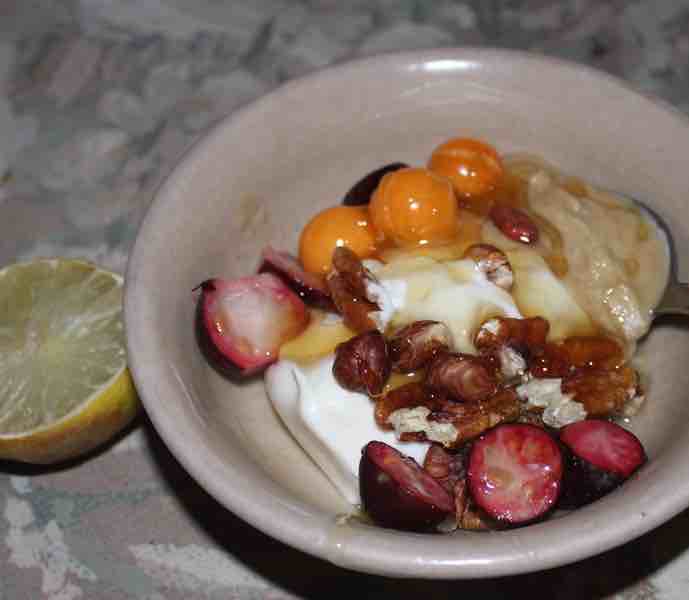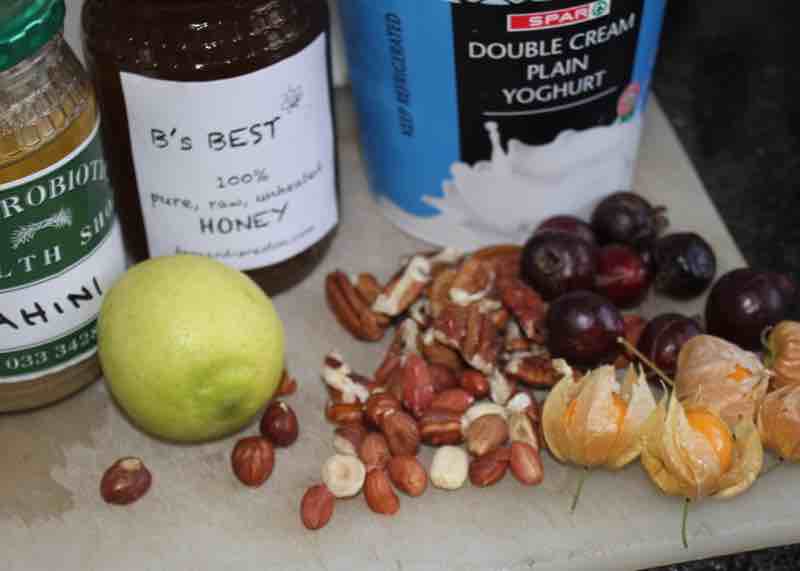- Homepage
- Fast dinners
- Baklava-nutrition
Baklava-nutrition
Baklava-nutrition is not very encouraging; it is rich in refined carbohydrate and very fattening. Keep the traditional recipe for high and holy days.
Part of the problem is that it tastes so good that you will have great difficulty refusing a second slice. It is a deceptive dessert; really it is bad stuff.

A traditional baklava recipe contains
- 1 pound of phyllo pastry
- 1 cup of sugar
- 1/2 cup of honey
- 1 lb of butter
- 2 Tbsp lemon juice
- 4 cups of chopped nuts
- 1 tsp of cinnamon
This will take you two-hours to prepare and bake; and make 36 small slices at 200 calories apiece.
As you can see it is made with highly refined carbohydrate, simple sugars and some nuts to give it a semblance of decency. Add a whole pound of butter to the mix in your baklava-nutrition and you will have an extremely fattening dish; it is a disaster.
One small slice has 20g of fat and 29 grams of carbohydrate; and it tastes so good that you will certainly have a second indulgence.
Talk to any chef and they will tell you that baklava is tedious to make; so folk buy it and then they also have added trans-fats to contend with.
For a normal, averagely busy person aim at no more than 150 grams of starch per day; if you are obese then less than 50g.
And if you are diabetic then really you should aim for under 20g. The common sense of baklava-nutrition is that you should indulge only once a year at Thanksgiving.
A baklava alternative

There is an alternative to the traditional baklava-nutrition which tastes just as good, has the best ingredients and is certainly not a junk food, par excellence. Could you serve something similar that takes no more than five minutes to prepare and has absolutely none of the negatives?
Yes you could and it is very simple. This actually is more like a baklava cheesecake; or Turkish helva.
- 2 Tbsp thick Greek yoghurt
- 1 tsp cream
- 1 Tbsp freshly-cracked nuts
- In season soft fruit
- 1 tsp of natural honey
- 1 tsp of tahini
- A few drops from a freshly-cut lime.
- A pinch of cinnamon
Stir the ingredients together in small dessert-bowls for your guests. Let them add the lime or lemon juice perhaps to their own taste. Notice there is no refined carbohydrate and less than 10g of starch.
And only the cream is questionable, depending on which you believe is the great enemy, fat or starch. Of course it could be both.
The material expressed on this page is gleaned from the nutritional and environmental literature; it is clearly referenced. A plain distinction is made between the author's opinion and that which is scientifically proven. When in doubt consult your health professional.
To suggest a correction or clarification, write to Dr Bernard Preston here. Contact.
Honestly this actually tastes better than a traditional baklava and you can put it together in no more than five-minutes. Add a couple of strawberries or other fruit for a variation; above we have used cherry guavas and gooseberries which are in season.
For Thanksgiving if you have lots of time this baklava recipe[1] from Natasha's kitchen will take a lot of beating.
Baklava-nutrition
Baklava-nutrition suggests an alternative way of making this wonderful Mediterranean dish in a jiffy; it has no sugar or pastry.
My use of tahini in addition to the traditional ingredients of baklava is to include the benefits of sesame oil; and wonderful flavour. You will find it at a Greek or Turkish shop. This is nutritious slow-food that tastes fantastic; and can be made fast.
There is one other reason that I as a beekeeper dislike the traditional baklava; once you heat honey it is ruined and of little more benefit that sugar. It's just there to make it look more nutritious.
You can read more about the benefits of raw honey at this page.
Fat or carbs?
This is a hugely complex subject, not to be covered in one paragraph. My own reading of the situation is that the obese almost always have a tendency to indulge in refined carbohydrate. And it is fat that provides satiety; removing all the cream and avocados leaves you famished at 11 o'clock.
So whole carbs are good, and so is fat depending on the diversity of your platter. Is there sufficient fibre and are there plenty of coloured foods?
Beware of trans-fats like margarine; and too much omega 6 which is inflammatory. Like I said, this is a profoundly difficult subject.
Conventional baklava-nutrition is very high in refined carbohydrate and in fat; and it takes an age to prepare and bake. A second on the lips and a lifetime on the hips is how the saying goes.
Enjoy a wide spectrum of natural, whole foods and you needn't be anxious; the berries and the lime in the photo above contribute three coloured items. Aim for a minimum of seven each day.
When browsing use right click and "Open Link in New Tab" or you may get a bad gateway signal.
Newsletter
Our newsletter is entitled "create a cyan zone" at your home, preserving both yourself and Mother Earth for future generations; and the family too, of course. We promise not to spam you with daily emails promoting various products. You may get an occasional nudge to buy one of my books.
Here are the back issues.
- Lifestyle and ideal body weight
- What are ultra-processed foods?
- Investing in long-term health
- Diseases from plastic exposure
- Intensive lifestyle management for obesity has limited value
- A world largely devoid of Parkinson's Disease
- The impact of friendly bacteria in the tum on the prevention of cancer
- There's a hole in the bucket
- Everyone is talking about weight loss drugs
- Pull the sweet tooth
- If you suffer from heartburn plant a susu
- Refined maize meal and stunting
- Should agriculture and industry get priority for water and electricity?
- Nature is calling
- Mill your own flour
- Bake your own sourdough bread
- Microplastics from our water
- Alternative types of water storage
- Wear your clothes out
- Comfort foods
- Create a bee-friendly environment
- Go to bed slightly hungry
- Keep bees
- Blue zone folk are religious
- Reduce plastic waste
- Family is important
- What can go in compost?
- Grow broad beans for longevity
- Harvest and store sunshine
- Blue zone exercise
- Harvest and store your rainwater
- Create a cyan zone at your home
Did you find this page interesting? How about forwarding it to a friendly book or food junkie? Better still, a social media tick would help.
- Homepage
- Fast dinners
- Baklava-nutrition
Address:
56 Groenekloof Rd,
Hilton, KZN
South Africa
Website:
https://www.bernard-preston.com